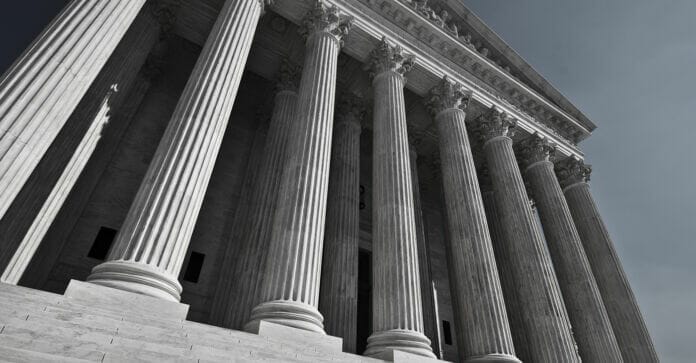
NNPA NEWSWIRE — A growing number of Americans reportedly believe that expanding the court and ridding elections of the Electoral College are keys to preserving democracy in America. This month, a bipartisan group of federal lawmakers led by Sen. Susan Collins (R-Maine) introduced the Electoral Count Reform Act of 2022 (ECRA) to ensure that electoral votes tallied by Congress accurately reflect each state’s public vote for president.
By Stacy M. Brown, NNPA Newswire Senior National Correspondent, BlackPressUSA
@StacyBrownMedia
The recent U.S. Supreme Court decision to overturn Roe v. Wade has raised concerns from women regarding bodily autonomy and palpable fear that other long-held rights may also be in jeopardy.
And with the ongoing hearings surrounding the January 6 insurrection and the attempt by former President Donald Trump to change the outcome of the 2020 election, momentum has increased in favor of abolishing the long-standing Electoral College.
A growing number of Americans reportedly believe that expanding the court and ridding elections of the Electoral College are keys to preserving democracy in America.
“Republicans use every weapon at their disposal against Democrats, but Democrats tend to behave like someone bringing a tennis racket to a knife fight.”
This month, a bipartisan group of federal lawmakers led by Sen. Susan Collins (R-Maine) introduced the Electoral Count Reform Act of 2022 (ECRA) to ensure that electoral votes tallied by Congress accurately reflect each state’s public vote for president.
“Adding more justices to Supreme Court and abolishing the Electoral College both help to give the majority of Americans the ability to have a say in what’s going on in their country,” said H.R. Bellicosa, the author of The Punishings, a novel about a world without abortion rights.
“We are headed toward minority rule if we’re not there already. Overturning Roe is a deeply unpopular opinion, but with a conservative majority on the court, the justices were able to further their theocratic agenda,” Bellicosa stated.
“More justices would combat that. The Electoral College has given us two recent presidents who did not win the popular vote – [George W. Bush and Trump]. America is under threat of being ruled by a deeply unpopular minority, and steps must be taken to mitigate that.”
A change.org petition has garnered more than 103,000 signatures from individuals desiring to abolish the Electoral College, a system established in the 1800s and resulted in the infamous “three-fifths compromise” in which three-fifths of an enslaved Black person would count toward allocating electors and representatives.
The U.S. Constitution holds that whoever wins the electoral vote claims the presidency during presidential elections even if the candidate fails to win the popular vote.
Further, historians noted that officials created the Electoral College to give slave states more power and to keep an agent of England’s King George from becoming president.
Neither situation rises as pertinent in the 21st Century, said historian and political scientist William S. Bike.
Bike said he believes it’s time to get rid of the Electoral College, and Democrats, while in the majority, should act.
“Republicans use every weapon at their disposal against Democrats, but Democrats tend to behave like someone bringing a tennis racket to a knife fight,” stated Bike, the author of Winning Political Campaigns, a how-to guide on political campaigning.
“So, Democrats expanding the Supreme Court would be a weapon seldom used before in American history, but without it, the extreme right will continue taking away Americans’ rights,” Bike asserted.
“They’re coming after Miranda, birth control, gay marriage, homosexuality, and possibly interracial marriage and racial equality.
“The negative to expanding the Supreme Court is that once the Democrats do it, the next Republican president will do it, then the next Democratic president. Eventually, the Supreme Court would become as big as a legislature. But it’s a chance Democrats must take if they want to protect basic rights.”
Georgetown University graduate Tim Rosenberger Jr., who’s completing a JD/MBA at Stanford University, said expanding the high court can improve America.
However, eliminating the Electoral College could hamper the country’s ability to preserve minority rights and ensure ongoing dynamism.
“Americans benefit from having smaller states that can be laboratories for innovation,” Rosenberger stated.
“Justice Antonin Scalia once noted the oddity of how non-representative the Supreme Court is,” Rosenberger noted.
“Every New York borough but Staten Island had a seat on the court for a time. At the same time, not one protestant, the prevailing American religion, sat on the court. Both the Supreme Court and the D.C. Circuit should start having geographically assigned seats with seats traditionally, if not explicitly, aligning with one person from each of the larger geographic circuits.”
Rosenberger continued:
“Eliminating the electoral college would overly concentrate political power in large urban centers and move America away from a diverse and complicated social and political tapestry.”
Content Writer Elena Zimmerman added that the benefits of expanding the Supreme Court in its current state are impossible to miss.
“Whatever the intentions were with the decision to appoint 9 judges, it would be difficult for anyone to argue the idea in mind was for one political party to appoint 66 percent of the justices of the most powerful judicial body in the country while systematically excluding the choices of elected presidents in the opposing party while in office,” Zimmerman stated.
“It would also be difficult for anyone to argue that it should be acceptable for new potential justices to lie during their confirmation hearings about their intentions to rule if appointed.
“Expanding the court during a democratic president’s tenure and with an evenly divided Senate could potentially balance this inequality of partisan power.”
Zimmerman further concluded that there’s “no longer a benefit to the Electoral College.”
“Particularly when it can be used exclusively to the benefit of only one party to override the popular vote,” she insisted.
Stacy M. Brown is an NNPA Newswire Correspondent


